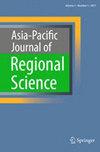Total factor productivity and institutional quality in Vietnam: which institutions matter most?
Abstract
The roles of institutional quality’s impact on firm performance are becoming increasingly prominent in the literature. This is true in the Global North and South. Vietnam has seen less research on this topic than other developing countries, so this paper seeks to rectify this by examining whether or not institutional quality influences firm performance, as measured by total factor productivity (TFP). This paper also digs deeper into the sub-components to see which institutions are the most influential. We applied the General Method of Moments (GMM) approach to a firm-level panel dataset covering the 2010–2020 period to examine institutional quality's impact on firm TFP. Results are explored by firm size and by ownership type (domestic private, foreign and state-owned). Using rich datasets covering institutional quality at the provincial level in Vietnam and also individual firm performance from 2010 to 2020, we found that Time cost (how long it takes firms to deal with the government on various issues) and Labor policy (how easy it is to hire good quality labor) are the most important of the 10 institutions studied. Additionally, while not all institutions influence TFP, institutional quality overall (all 10 institutions combined) clearly has a positive influence on TFP. This study fills a research gap by examining the relationship between institutional quality and firm performance in Vietnam. The findings emphasize the significance of Time cost and Labor policy as influential institutions and highlight the positive overall impact of institutional quality on TFP. The policy recommendations offered provide valuable insights for the government to further enhance firm productivity through targeted measures.

 求助内容:
求助内容: 应助结果提醒方式:
应助结果提醒方式:


